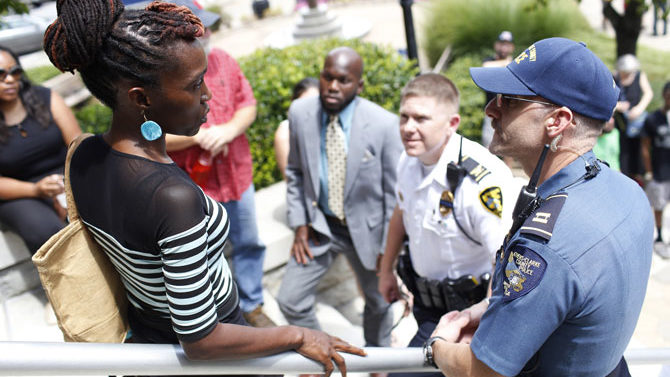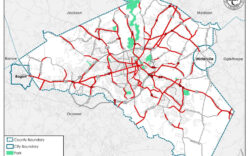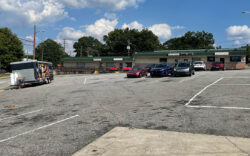As protesters angry over police killing African Americans were clashing with police in Baton Rouge, LA, and St. Paul, MN, thousands more protesters were taking to the streets and congregating outside the governor’s mansion in Atlanta, and Dallas was mourning for five slain officers, it was a very different scene in Athens last week.
Hundreds of people—more of them white than black—gathered outside Athens City Hall on July 10 for a peaceful Black Lives Matter vigil to hear a message of, as organizer Mokah Jasmine Johnson put it, “love and respect” for everyone.
“All the people who want the violence and killing to stop, we need to come together, because we don’t want this to happen in our community,” said Johnson, a teacher and hip-hop promoter who also organized a protest against discrimination at downtown businesses in January. “We don’t want police officers killed out of vengeance. We don’t want young black men shot down.”
Rather than don riot gear and march with the protestors, Athens-Clarke County police, who had been in contact with Johnson as she planned the vigil, deployed just a couple of officers to stand watch over it. After all, police should not be “an occupying military force,” as Chief Scott Freeman is fond of saying. “It’s all about the Constitution, their First Amendment rights,” ACCPD Deputy Chief Justin Gregory said as he wandered around the outskirts of the vigil. “I’m just here to make sure they have what they need.”
It wasn’t always this way, as Ishmael Cuthbertson well remembers. Twenty years ago in the Nellie B neighborhood where Cuthbertson—better known as the rapper Ishues—grew up, two white police officers shot and killed Edward Wright, a 20-year-old with a history of mental illness who was wandering the streets naked and unarmed. Wright, authorities said at the time, attacked one of the officers, who shot him five times before Wright knocked the gun out of his hand and his partner fired the fatal bullet. The officers were cleared of wrongdoing, but Wright’s shooting sparked near-riots in Athens.
“Me and my friends organized a rally,” Cuthbertson said. “Twenty years later, we’re marching about the same thing.”
The Wright incident brought about much-needed change in Athens. Jack Lumpkin, an Athens native and an African American, was installed as the new police chief, and he brought with him the philosophy of community-oriented policing, where instead of running and gunning, officers get out of their cars and interact with the people they are supposed to protect.
Lumpkin retired in 2014 and took the top-cop job in Savannah, where he has his work cut out for him. (In addition to the city’s horrific homicide rate, police there came under fire last week for tasing an innocent young black man to whom they were trying to serve a warrant in a case of mistaken identity.) Lumpkin “really developed a police department that was built on compassion, and I wanted to be part of that,” Freeman said at a community forum on racial issues July 12.
Freeman is quickly putting his own stamp on the department, though. Soon after coming on board last July, he demoted his two assistant chiefs, both holdovers from the Lumpkin era (one resigned and the other retired) and installed Gregory, previously the training administrator, as his No. 2. The department hosts a citizens’ police academy and youth summer camps, and its fair and impartial policing classes are open to the public.
He’s not stopping there. The department is rewriting its policies from scratch, working with UGA’s Carl Vinson Institute of Government on a strategic plan, appointing a citizen’s advisory board, revising its hiring practices and developing a new website where policies and complaints against officers will be posted for the public to see, Freeman said at the forum, held at the ACC Library.
ACCPD currently has an internal advisory board made up of representatives from each unit and division, as well as a “leadership team” consisting of all the captains in the department. To that, Freeman said he plans to add an external advisory board that would be a diverse group of about 40 citizens.
“Diversity is crucial,” he said. “The police department has to represent every segment of the community.”
Freeman said he made an effort to boost the number of minority officers while filling the 27 vacancies in his 240-officer force. “It’s difficult because you have people of all races who do not want to be law enforcement officers because of the tension all around the country right now,” he said. But those positions have been filled.
One attendee wanted to know how applicants are vetted. “There are a lot of trigger-finger policemen out here that are undercover racists,” she said.
Freeman said potential officers take a psychological test and a test that measures cultural sensitivity and implicit bias. In addition, recruiters scour applicants’ social media sites looking for signs of racism and conduct background checks that include interviews with neighbors and co-workers. Applicants are also interviewed by a panel.
“If we put one wrong person out there and give them a badge and a gun, the whole community pays the price,” he said.
Just weeks after taking over at ACCPD, Freeman was tested. Officer Jonathan Fraser was accused of beating up a drunken and nearly unconscious UGA student outside a downtown hotel. Freeman fired him and pressed charges. “He should have been fired years prior to that taking place,” Freeman said.
In April, a rookie officer stopped to get a drink at an Eastside gas station and saw a young black man in the parking lot pouring liquor into a cup. While questioning the man, the officer’s body camera footage showed him reaching for a pistol on his hip. The officer shot him. (He was not seriously injured.) Freeman defended the officer, saying he had no other choice.
“If you do your job, I will back you up to the hilt, even if it costs me my career,” Freeman said at the forum. “If you violate somebody’s constitutional rights, I will fight the GBI to be the first one to put handcuffs on you.”
That attitude won Freeman round after round of applause from what could have been a hostile audience.
“There’s a lot of things going on in the country; there’s a lot of things going on the world,” said Knowa Johnson, Mokah’s husband and business partner. “But right now, locally, we have the opportunity to be an example for the rest of the country, the rest of the world.”
Like what you just read? Support Flagpole by making a donation today. Every dollar you give helps fund our ongoing mission to provide Athens with quality, independent journalism.









